The Lawmatics Blog
Insights on legal marketing, automating the law practice, and legal tech in general
Law firms spend a lot of time on the same three problems: getting the right information from new leads, quickly signing prospects after they’ve been qualified, and knowing which marketing dollars are actually paying off. In this session, Product Manager Devon Butler and Account Management Lead Clare Struzzi walk through new and upcoming Lawmatics features that address each of those challenges, from QualifyAI lead evaluation to e-signature packets and upcoming Meta Ads tracking.
Time stamps of key takeaways
7:15 – Send one link for forms, signatures, and payment
16:13 – Add automation around packet completion
24:03 – Set up QualifyAI agents by practice area
31:25 – See the “why” behind each QualifyAI recommendation
45:11 – Track Meta Ads spend and leads automatically
Webinar slide deck
Successful marketing enables an organization to connect with its target audience in the right place at the right time. Research indicates that the average U.S. consumer spends over seven hours each day looking at a screen, which makes the internet the best place to meet them. Businesses worldwide are taking advantage of this reality by employing effective digital marketing strategies. In doing so, they help ensure their marketing efforts are more likely to reach prospective clients actively in the market for their products and services. Digital marketing includes all marketing strategies that utilize the internet. When used in conjunction with law firm marketing automation, digital channels such as search engines, email, websites, and social media can be used to connect with current and prospective legal clients. Unlike traditional strategies, digital marketing enables firms specifically target leads more apt to retain their services. In addition, digital marketing is generally more cost effective than traditional marketing and allows businesses to measure success and make changes based on legal data analytics.
What are the 5 benefits of digital marketing?
There are many benefits of digital marketing for lawyers. Five of them include:
1Widen reach
Digital marketing allows organizations to target a broader audience than traditional efforts – after all, virtually the entire planet has access to the internet. This broad reach allows firms to communicate easily with their target audience as opposed to traditional marketing, which limits businesses by only enabling them to target leads in their geographical location.
2Increase engagement
With so many new brands out there, finding the right clients is getting more and more challenging. Therefore, knowing what your customers are saying about your brand. You can engage with them by listening to what they are saying about your brand on social media.
3Monitor competitors
Digital marketing, particularly via social media, doesn’t just enable you to engage your clients. It also allows you to monitor what your competitors are doing online. For example, you can review the marketing campaigns of other firms in your area and see how they connect with their clients to improve your current strategies and stay ahead of the competition.
4Analyze data
We live in a digital age, and this must be reflected in our marketing efforts. Digital marketing enables organizations to analyze results and data on strategies developed online. Through the review of this data, marketers can better understand their prospective clients’ preferences and alter their efforts based on these findings. However, traditional marketing does not provide a way to analyze whether certain marketing efforts are more successful than others.
5Improve efforts
Since digital marketing can generate reports, marketers can quickly see how their target audience responds to their digital marketing campaigns. These reports allow you to change course based on your findings. As a result, your strategies and content will always be based on your client’s preferences, something that cannot be measured with traditional marketing.Having a comprehensive law firm digital marketing strategy is one of the best ways to build trust and credibility with potential clients and grow your law firm.
Digital marketing strategy
Your specific online marketing strategy will depend on whether you’re marketing yourself as a lawyer or marketing the entire law practice.Legal professionals who are marketing themselves should focus on their personal brand. They must provide evidence of their credibility and trustworthiness to potential clients or firms where they might want to work. To shore up your personal marketing efforts, ensure your LinkedIn profile, biography, and other online profiles feature professional photos and outline your achievements, approach, and values. Positive reviews from clients or firms should be included in marketing materials, if possible. Personal brand is also essential when marketing a law firm, as a firm’s brand is reliant on the brands of all the lawyers within it. Therefore, helping firm employees understand how to market themselves is a critical component of any law firm’s digital marketing strategy.Ethics is another crucial factor to consider. Whether an individual or an entire firm is the focus of marketing efforts, each jurisdiction has its own unique set of guidelines on the ethical responsibilities that must be followed when designing an online marketing strategy. Two important things to remember:
- Avoid labeling yourself as an “expert” unless you have the qualifications required by your jurisdiction, and
- Be highly cautious about inadvertently sharing details about your lawyer-client relationships.
How do lawyers attract more clients?
The most common types of digital marketing for lawyers can be broken into eight general categories. These include:
- Search Engine Optimization (SEO) – including words and phrases that legal consumers are using to search for information online in firm-generated content.
- Pay-per-click - paid advertisements and promoted search engine results designed to increase search traffic.
- Social media marketing - using social media and social networks to market legal services, engage with existing clients, and reach new prospects.
- Content marketing - employing storytelling and information sharing to increase brand awareness.
- Email Marketing - a form of digital marketing that utilizes email to promote a law firm’s services.
- Mobile Marketing – advertising focused on reaching the target audience via smartphone or tablet.
- Marketing Analytics - tools designed to track and measure the success of digital marketing campaigns.
- Affiliate Marketing – a strategy that involves collaborating with third-party influencers to promote a firm’s services.
Lawyers are permitted to advertise but they must follow specific lawyer advertising rules and ethical obligations. For example, American Bar Association (ABA) Rule 7.2 on Communications Concerning a Lawyer's Services specifies that lawyers can communicate information about their services through any platform. Still, there are rules surrounding lawyers and social media ethics that specify what they can share.
How to market a law firm of social media
To attract new clients through online advertising, lawyers must go where their prospects are – social media. There are plenty of social networks to choose from, so you’ll need to determine which social media platforms are best for your law firm and particular practice areas. With a modest investment of time and research, social media marketing can positively affect your law firm’s growth.
Are you unsure about what law firms post on social media? Here are a few suggestions on how to use social media in your law firm marketing:
- Twitter. Try following some influential legal leaders on Twitter and engage in thoughtful conversation.
- LinkedIn. Create an effective law firm LinkedIn page, ensuring it is separate from your personal LinkedIn profile. Both should be optimized to help you and your firm stand out to potential clients while differentiating from the competition.
- Facebook. Create a Facebook advertising campaign to position yourself as an authority in your space and attract new clients.
- Video marketing. Video is one of the most effective marketing tools for lawyers, although the legal industry has been slow to adopt it. However, video marketing for lawyers that tells a story is informative, entertaining, and engages leads.
As with any digital marketing, ensure that your social media marketing campaigns follow your particular jurisdiction’s ethics and advertising rules.
How to market a law firm via email
Email marketing is another highly effective way to reach marketing goals for a law firm. Research has found that email is almost 40x more effective than social media for turning prospects into clients. Here are a few ways to make your email marketing campaigns even more effective:
- Embed a video in your email. Video is an excellent way to introduce yourself to your leads and prospective clients, and it’s not as difficult as you might think. Many video hosting providers provide you with an embed code that can be imported into the HTML editor section of your email service provider.
- Automate your email campaigns. Automation enables your law firm to respond to every prospective client that provides their contact details with a personalized email. Moreover, automation provides a prompt response – when your leads are most engaged and looking for a lawyer. If you reply manually, you can only do so when you have time, which might be after they’ve hired another attorney.
- Don’t forget to follow up. Following up after your first email can boost reply rates by as much as 30 percent, while those who send only one email with no follow-up garner an average reply rate of 16 percent. Sending 2-3 follow-up emails is the most effective – those who flood their prospects’ inboxes don’t necessarily have a better chance of getting a reply.
Automated drip email marketing enables lawyers to contact people reliably, consistently, and in a personalized manner.
How to market a law firm with blogging
Lawyers who enjoy writing can put those skills to use to grow their law firm. Blogging (content marketing) is a great way to build your brand and authority. Content can be used to showcase expertise in a given area. A lawyer or law firm that provides helpful answers to general legal questions potential clients have can build trust and confidence. Demonstrating authority in a particular area of law makes it more likely that a prospect will eventually hire you.If you decide to start a blog, take a “thought leadership” approach and try to identify legal-related evergreen topics to write about. Ensure your content has a clear focus, takes on a professional yet approachable tone, and provides helpful information (without offering specific legal advice).
Why do lawyers advertise on billboards?
Have you ever wondered, ‘Why do lawyers advertise on billboards?’ It’s because they are in place 24/7, can be viewed thousands of times per day (in a high-traffic location, and have been proven effective but also quite expensive. Instead, lawyers considering advertising on a billboard should think of social media as a digital billboard—for a much lower price.
Does SEO work for law firms?
If you create a law firm website to market your firm, but no one finds it when they search online, will potential clients be able to find you? Search Engine Optimization (SEO) works for many types of businesses – restaurants, retailers, tech enterprises, and law firms -any company that attracts customers via Google can benefit from SEO.To maximize your website, adhere to SEO best practices for lawyers. Ensure that your site is accessible and provides useful, quality content -- this is what search engines like Google seek. Ranking at the top of search results doesn’t happen instantly, and it usually doesn’t happen without some effort to improve your site’s SEO.
What is the best form of advertisement for a lawyer?
Legal marketing generally encompasses advertising, public relations, trademarks, and other efforts to increase a law practice’s visibility. Numerous companies provide marketing services for lawyers and specialize in online marketing for attorneys. Some of the companies that provide legal marketing services include:
- ALM Marketing Services – delivers high-level lawyer marketing services as well as financial, consulting, insurance, and allied services.
- FindLaw – features one of the largest online legal directories to enhance various legal marketing services, including web design and SEO.
- LegalMatch – offers an on-demand attorney-client matching platform featuring centralized and multi-dimensional legal marketing services accessible through an attorney member subscription.
- LexisNexis - provides legal and professional solutions for law firms, government agencies, businesses, corporations, and academic institutions.
- MAX Advertising – a legal marketing agency for law firms that uses the “strategic integrated marketing” approach.
- LawRank – a legal marketing agency dedicated to providing legal firms with superior search marketing results.
More and more firms are choosing to automate the leg work of their marketing efforts. Marketing automation software automates tedious tasks, allowing lawyers to drive growth in the business while staying focused on clients. For example, these platforms create an email marketing template that goes out automatically, providing prospects with timely and personalized marketing materials and giving lawyers the ability to measure the success of their automated marketing efforts – thanks to built-in visual analytics features.Lawmatics law firm marketing automation helps you seize every new client opportunity with targeted messaging and impeccable timing. To learn more about how Lawmatics can streamline your firm’s marketing efforts, request a demo today.
You’re likely investing in multiple marketing activities without knowing which ones are truly bringing in the most revenue – or which are bleeding you dry. It's time to move beyond simply counting leads. Start understanding the impact of your marketing channels on your practice's bottom line.In this webinar Lawmatics Director of Strategic Partnerships Blake Roberts welcomed Chris Nelson and Shaun Bruno from CallRail. Chris is the Senior Manager of Vertical Marketing at CallRail, and Shaun is the Manager of Demand Generation.
Time stamps of key takeaways
0:00 — Introductions
Learn a little bit about Blake, Chris, and Shaun. Then get a high-level overview of why marketing performance metrics are so important.
9:57 — Marketing channel overview
Marketing channels can be categorized in different buckets. Online, or digital marketing, channels, include search engines, social media accounts, digital ads – and more. Offline channels include anything physically interactive: broadcast media, print, billboards, word-of-mouth referrals. The first step to understanding your most profitable channels is understanding the online or offline environments that generate clients.
16:06 — Top channels in 2023
Shaun and Chris break down the results of CallRail’s 2023 poll of the most effective channels, by both brand awareness and lead generation potential.
22:15 — Right fits for your firm
Where do you want to go with your practice? Who is your ideal client? What are your competitors doing? Shaun and Chis run through these essential questions and how to identify the best marketing channels for your law firm’s goals.
31:58 — Your law firm’s website
While your firm’s website is a digital marketing channel in and of itself, it’s also a booster for other marketing channels. Here, Shaun explains exactly what that means.
39:21 — Measuring channel effectiveness
So you know what marketing channels exist, you know what channels align with your goals – but how do you measure the effectiveness of your marketing efforts? Only 42% of firm’s CallRail surveyed base their marketing spend on attribution metrics provided by reporting tools. That means the majority of law firm’s aren’t creating a data-informed marketing strategy. In this section Shaun and Chris discuss the importance of measuring channel effectiveness and how reporting tools can help your firm.
1:00:59 — Q&A
If you had a question come up during this webinar, someone else likely had the same thought. Stick around to see if anyone asked your question during the Q&A portion.
Webinar slide deck

Register for upcoming Monthly Deep Dives here.
From consultations to court dates to signing meetings, you undoubtedly schedule a plethora of appointments with potential clients. Lawmatics has all the tools you need to facilitate a smooth process, from the initial booking to confirmation, reminders, and post-meeting correspondences.While you may know that all of these tools exist in Lawmatics, you may not yet be using them all to their full potential. We are thrilled to share this deep dive into every aspect of appointment in Lawmatics.
Calendar Sync
Before you even begin booking appointments, we first recommend that you sync your external calendar to Lawmatics. Note that this is an individual user setting, so each of your firm’s users can connect their own calendar account. By initiating this sync, you permit that any of your appointments booked via Lawmatics to seamlessly sync onto your external calendar. The sync eliminates any need for you to be hopping back and forth between multiple calendars, such as your Google Calendar or Outlook and Lawmatics, when booking an appointment.To sync your Calendar to Lawmatics:
- Navigate to the Settings page in Lawmatics by clicking the gear icon near the top right of your screen.
- Select Calendar from the left sidebar. If you have not yet synced your calendar, you will see options to sync for each calendar provider.
Once you have walked through the necessary steps, your page will look similar to the one shown below.
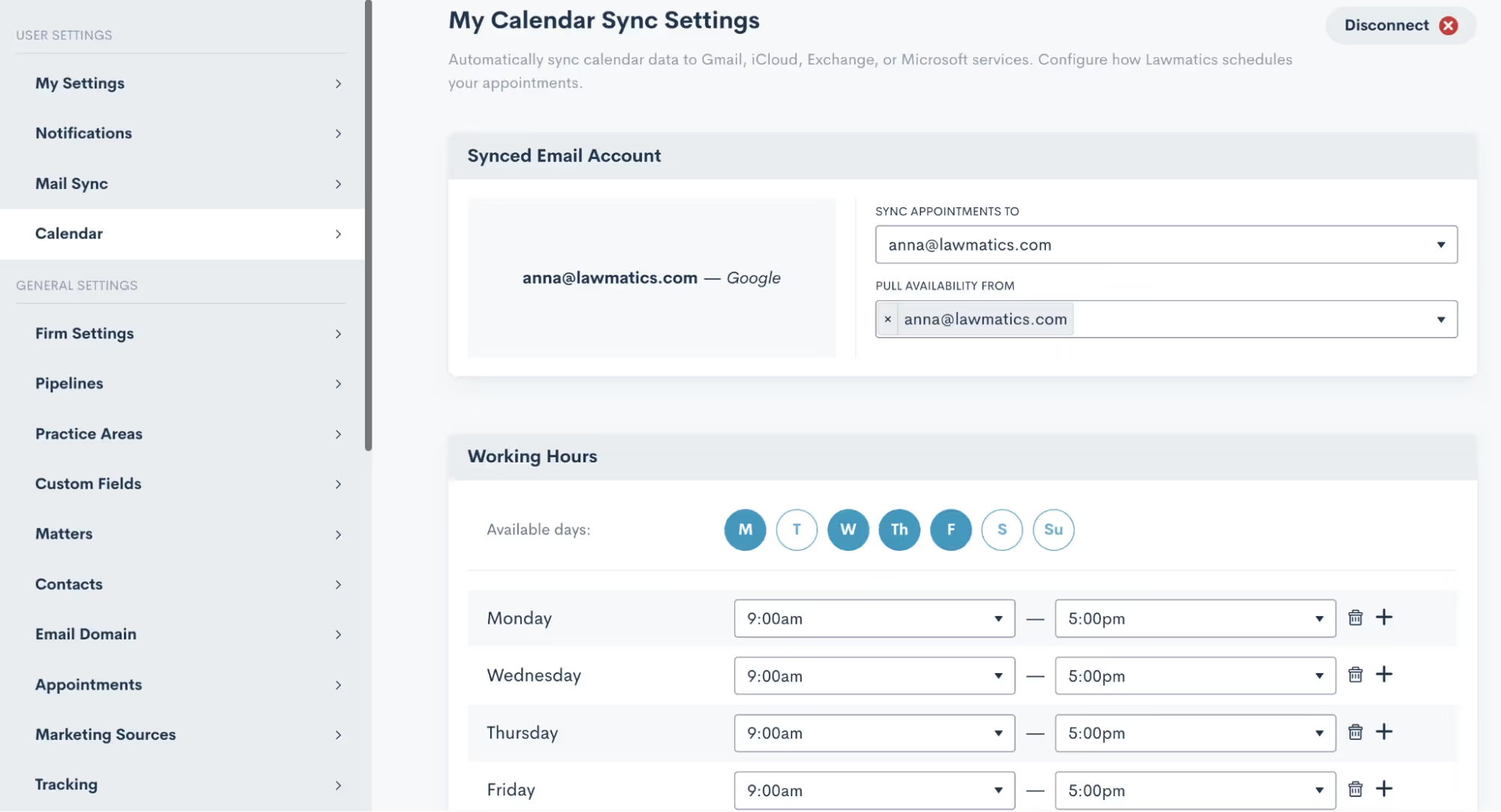
From here, you can easily select your availability hours as well as Buffer Time, Lunch Hour, and other availability settings. These options will come into play for our automatic scheduling, which we’ll discuss more later.
Appointment Settings
In addition to syncing your calendar, there are a few other settings relating to appointments that you’ll want to get squared away. Select Appointments from the main settings menu to get started.First, make sure you create your firm’s various Appointment Types. This is an essential step before you begin booking appointments in Lawmatics. Appointment Types are used to distinguish between the different emails, reminders, follow-ups, etc that are used for each different type of appointment your firm may hold.
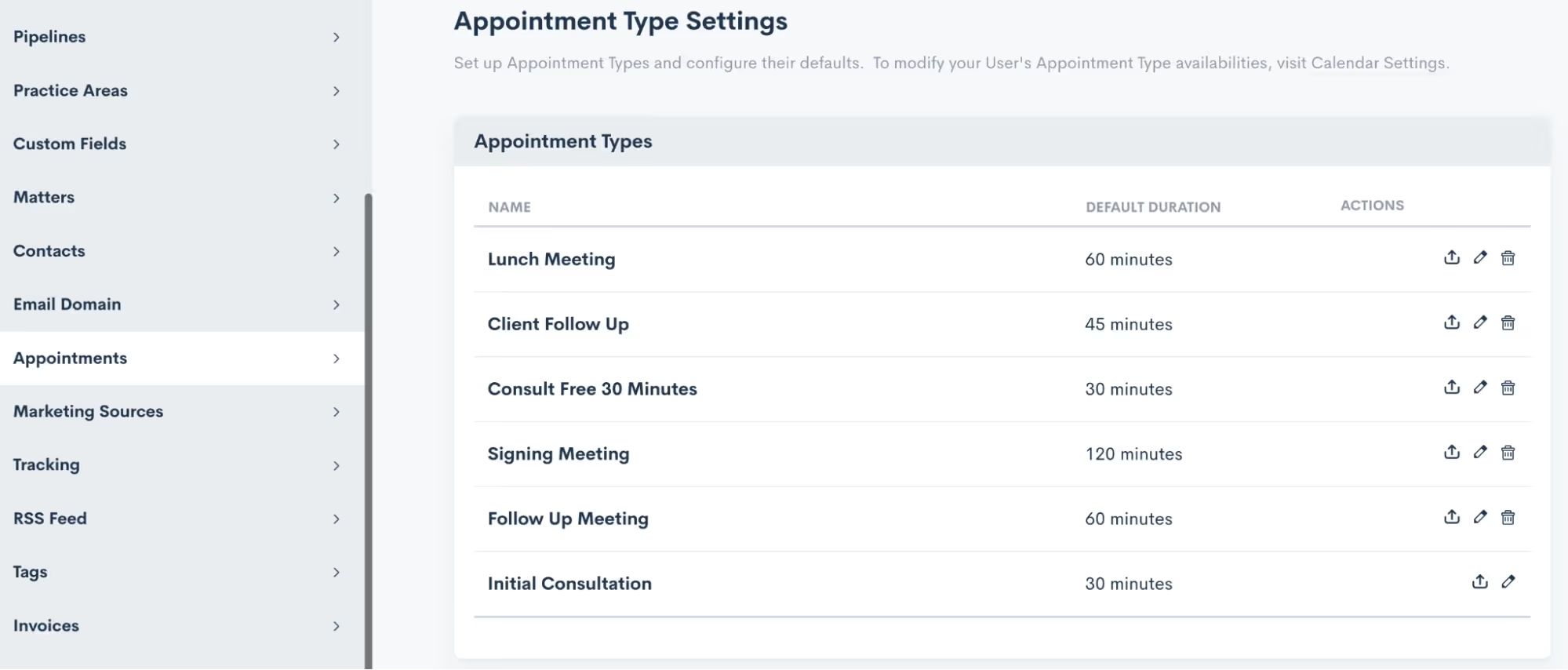
Note that these are completely customizable and can be edited or updated at any time.
Scheduling Appointments
Now that you have synced your calendar and set up your appointment types, you are ready to start booking appointments in Lawmatics. Within the platform you will find many different ways to go about scheduling your appointments. Throughout your intake process you may wind up using some combination of these methods. Let’s walk through each of them.
Calendar
The first and perhaps the most obvious way to book an appointment is from the Calendar, found under the CRM tab. Simply select Calendar from the drop down menu, and you will then see a summary of your Lawmatics appointments, as well as your Tasks.
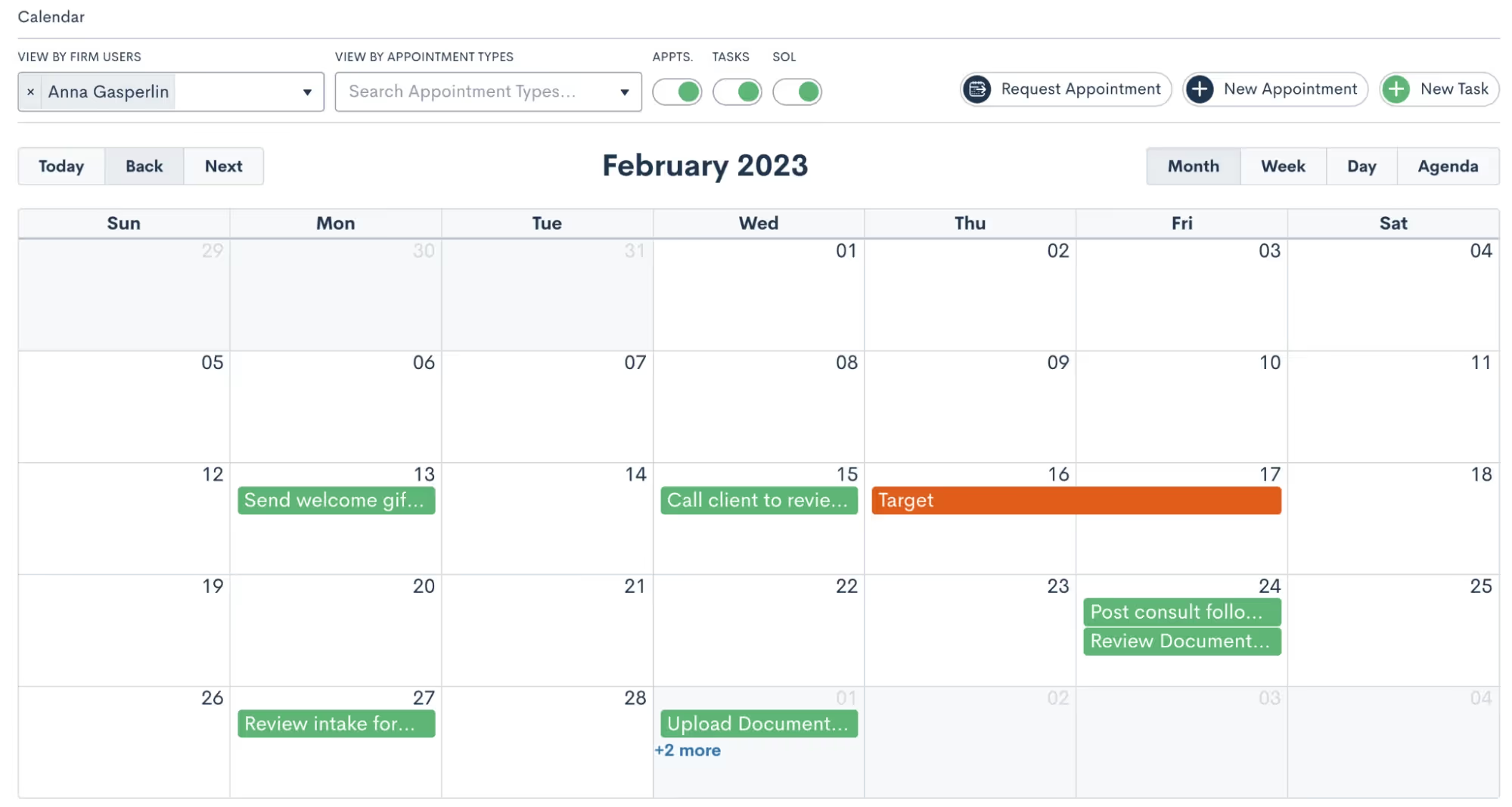
Click on the New Appointment button at the top of the page to book a new appointment. You will then be prompted to fill in details on the appointment and make selections such as the location, attendees, etc. No matter which method you choose to book an appointment from the options outlined here, you will see a similar window when scheduling.
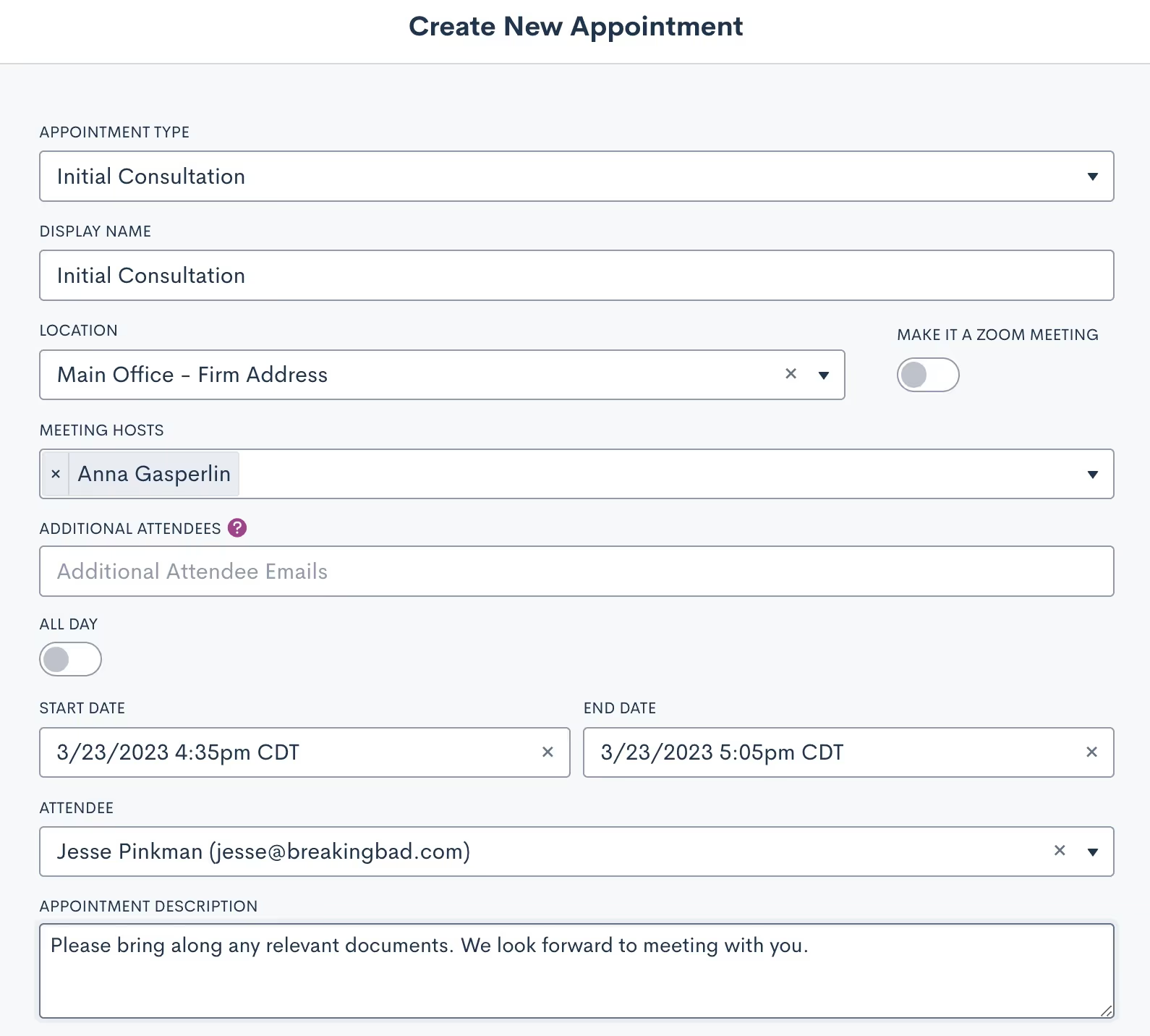
Matter Profile
You can also book appointments directly from a matter’s profile. Simply navigate to the matter using either the search tool or clicking on their name from the pipeline, then click the Schedule Appointment button.

Note that there are two options for appointments, highlighted above. Schedule Appointment allows you to simply choose the date and time and book the appointment. Request Appointment on the other hand sends out a booking link for the recipient to choose their own appointment time based on the host’s availability. Read on to learn more about that feature.
Custom Form
Forms are another common method for booking appointments. If using an internal Form, you have the option to select either an Appointment field, or the Booking Request field, both highlighted below.
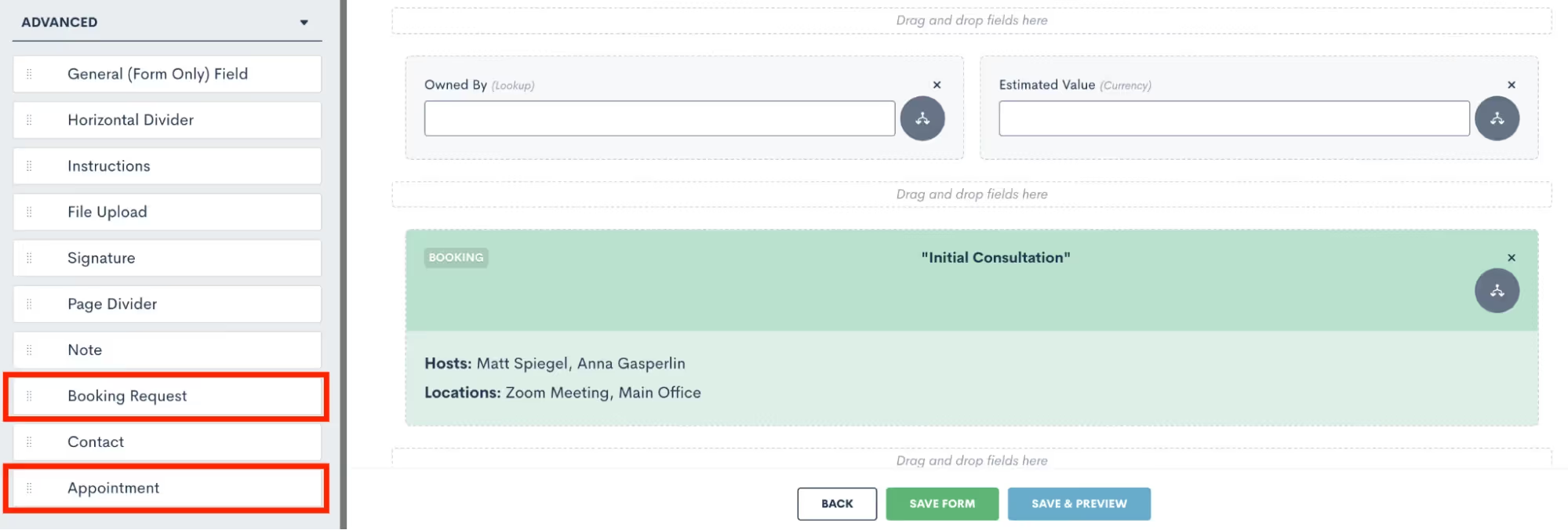
The Appointment can only be used on internal Forms, since it allows the internal firm user to select the exact date and time for scheduling the appointment. The Booking Request option gives the client the chance to schedule for themselves based on the host availability.
Booking Form
A Booking Form is similar to a Custom Form but with one exception, it will always contain a booking request whereas this is merely an option on a Custom Form. This scheduling method is great for embedding on your website, since it can simultaneously capture a new lead and prompt them to schedule their own appointment.
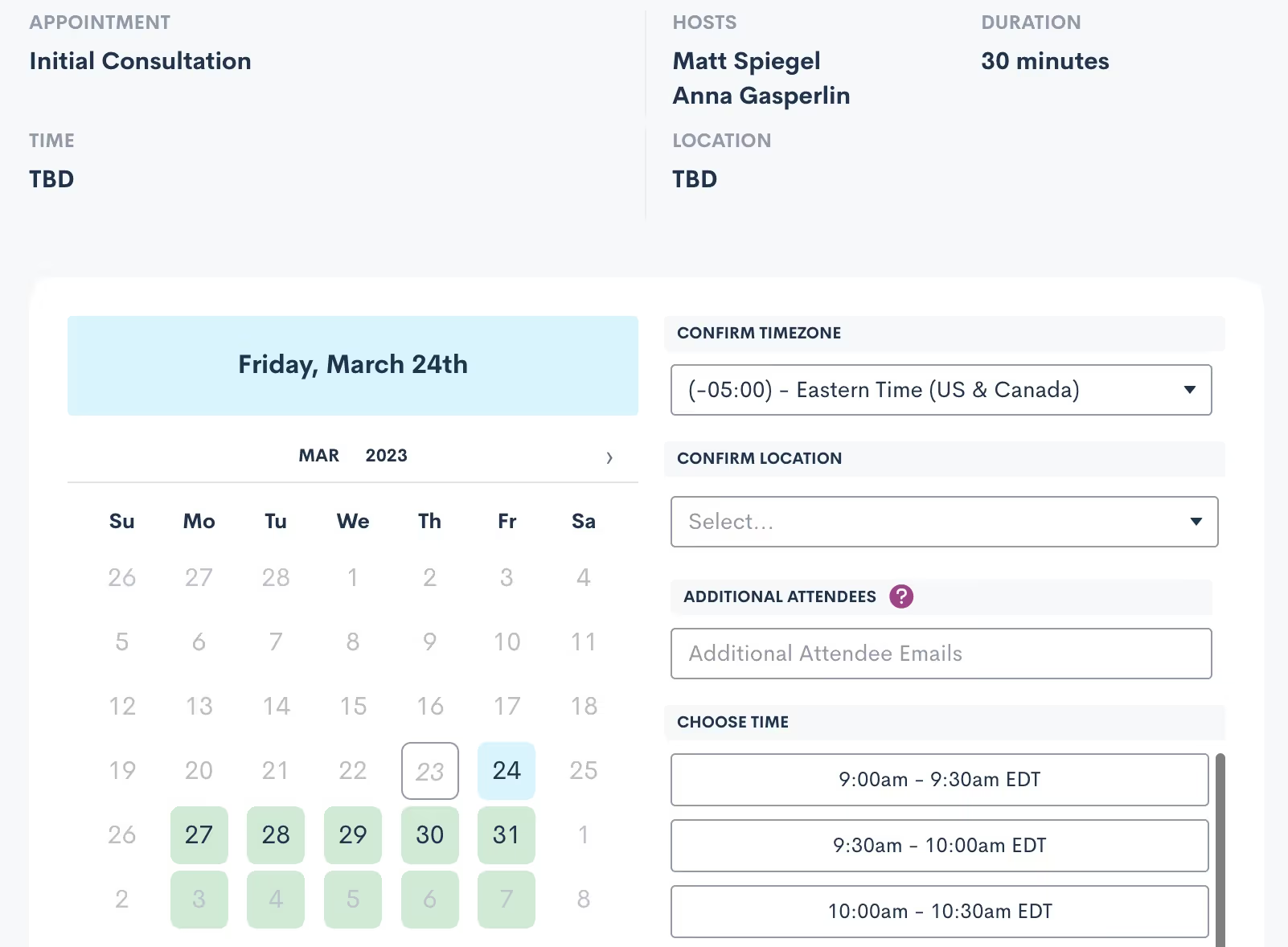
Bonus: Use a booking form with our new Payment Gateway feature to easily collect a consultation fee
Booking Link
Last but not least, you can also use a simple Booking Link to allow leads or clients to book their own appointment. Booking links are generated from the Appointments page in settings, click the arrow icon (visible on the far right for each appointment type) and then make your selections as shown below.
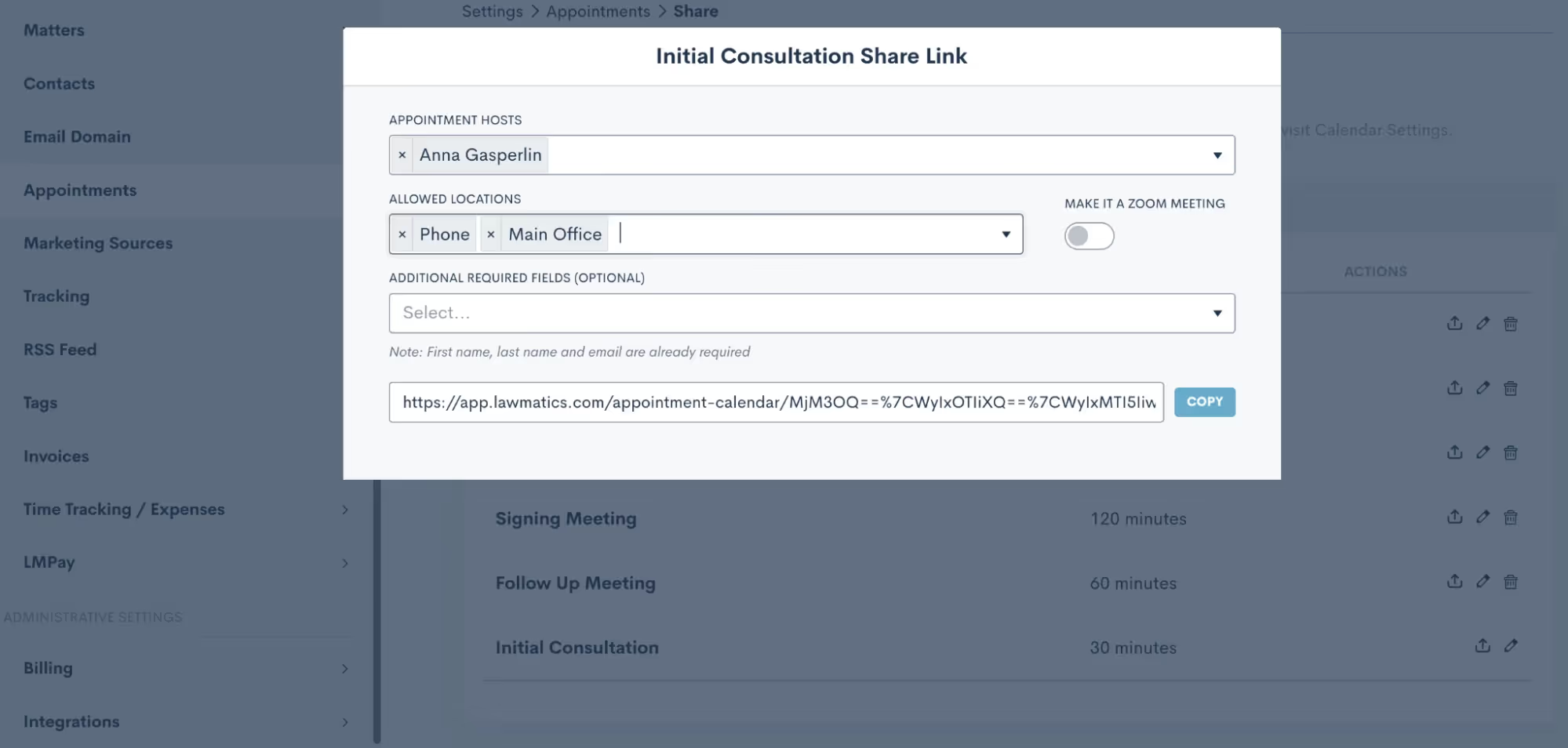
This link could be used in an email template, connected to a button on your website, or even used internally.
Confirming Appointments
Now that you know the ins and outs of booking appointments, it’s time to dive into the client experience side of things. Your leads and clients will absolutely love the experience of receiving an instant email or text message after they schedule letting them know that everything is confirmed and sharing any other pertinent details.While you may be accustomed to using an Appointment Automation to confirm appointments, we’ve made this even easier with our new default confirmation option — no need to build a dedicated Automation any more. When you navigate to the Appointments section of the Settings menu, you now have the option to create a Custom Email and/or SMS template for confirming each of your various appointment types. This confirmation will be sent automatically at the time the appointment is scheduled.

When setting up your Appointment Confirmations, you can create your own custom email template (along with any merge fields) and/or create a text message template as well.

Make sure to select which appointment type(s) your confirmation applies to, as well as any practice area limitations that should apply for this confirmation. This setting allows you to easily set up various confirmation messages for different appointment types, without needing to create a bunch of separate automations.
Appointment Reminders
Similar to Appointment Confirmations, Appointment Reminders are also now set up on the Appointments page within settings. While you still have the option to use appointment Automations for sending out your reminders, we have made it much easier with this new built-in setting.Much like with appointment confirmations, set up your appointment reminders for each appointment type.

Additionally, you may also set up multiple reminders for a single appointment type if you wish to have reminders go out on multiple time frames, such as 1 week before, 1 day before, etc.Once again, you no longer need to build any Automations for confirming or reminding of your appointments. These simple settings will handle everything!
Rescheduling
In a perfect world, all clients would show for all of their appointments as scheduled. But unexpected conflicts do arise and thus rescheduling is often unavoidable. Thankfully, Lawmatics has simplified this as well.When you use Booking Forms or Appointment Requests, you will always have the option to include a Reschedule option right within the scheduling module. So let’s say someone is booking their appointment. Immediately after they have chosen a date and time, they can simply return to the initial request and select an alternate time slot, as opposed to booking a new appointment all together.

Above you see an example of the Reschedule Setting option within a Booking Form. Simply toggle that on to include the Reschedule Link.In addition to using the Reschedule Link on automated Appointments, you can also manually reschedule any appointment by simply editing that Appointment either from the Calendar or from the Matter Profile, shown below.
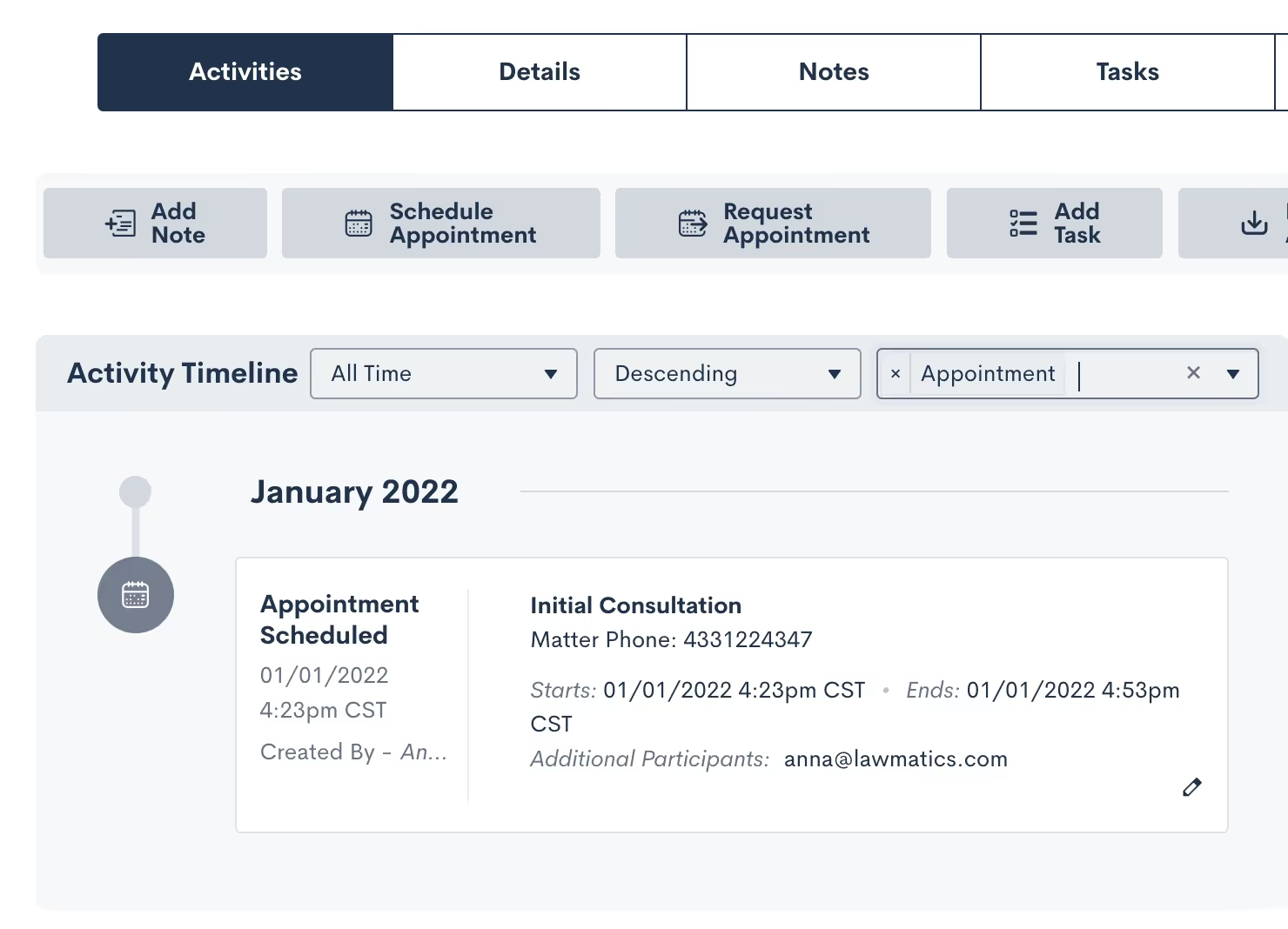
Note that when an Appointment is rescheduled in Lawmatics it will also automatically be rescheduled to the new time on your external synced calendar. Additionally, any Appointment Reminders that you have set up in your Settings as described above will also run as per the new time. Even if they had already been sent relative to the original appointment time, the reminders will resend based on the new date and time.
Conclusion
Lawmatics can tackle anything you throw at it when it comes to your appointments. A consultation with a new lead is often the first impression they have of your firm, so it is essential to make the scheduling process a smooth one.From automated booking links to customized confirmations and reminders to easy rescheduling, appointments are sure to be a breeze with the help of Lawmatics.
We’re thrilled to share that Lawmatics has once again been recognized by Legal Tech Publishing and Above the Law! Our CRM platform has been listed in their Practice Management Buyer’s Guide for 2023. With several new features since we were featured in last year’s guide – from conflict checking to sending emails from your outbox – Lawmatics is proud to offer Legal Tech readers a comprehensive all-in-one CRM and automation platform. We’re incredibly proud to share our vision of elevating the client experience via automations in a catalog of outstanding legal technology solutions.Why legal tech publishing recommends Lawmatics
- Automations streamline repeatable processes and non-billable tasks, increasing productivity and results for clients.
- Time & billing features – including LMPay – simplify payment collection.
- Task management features keep everyone on the same page.
- Our user-friendly client portal allows for easy client-attorney communication, eliminating the game of email and phone tag.
- Lawmatics streamlines every step of the client intake process, from processing inquiries to securing paying clients.
Check out the full review in Legal Tech Publishing’s Practice Management Buyer’s Guide: 2023 Edition here.
According to the American Bar Association's 2022 Profile of the Legal Profession, just 38% of lawyers and 30% of judges in the United States are women. While that portion has been climbing steadily over decades, law is still a male-dominated industry. That's why we wanted to take Women's History Month as an opportunity to ask our female-identifying customers what being a woman in law means to them. Here are some of their responses.
What does it mean to you to be a woman in law?
“
“Being a woman in law means I can continue the legacy of women that have gone before me to fight for the rights of the oppressed, help those who would otherwise not afford help, and better society.”
— Anonymous
“
“It means that I am a leader. I'm showing my daughters that gender and social expectations do not need to limit our dreams.”
— Anonymous
“
“It's empowering. It is an opportunity to uplift voices historically excluded from the legal and policy realm. It is an opportunity to challenge patriarchal systems of privilege, hierarchy, ownership, dominance, and exclusion.”
— Mara Yarbrough, Staff Attorney, New Mexico Environmental Law Center
“
“To be a woman in law means to be a woman of power and responsibility.
Being a woman in law means being consistently under-estimated and having to work harder than your male colleagues to be heard and respected. Women are expected to be nice, polite and reasonable. If we behave assertively or with confidence, we are labeled “aggressive” or worse. A man can interrupt a woman without notice or regard, but when a woman interrupts a man during the same conversation, it rarely goes unnoticed or unchastised.Being underestimated (and often over-criticized) is a strength. We yield power through bias. When we get fierce it’s shocking. When we call out bad behavior, it’s even more so.We have the power to make change. We have the responsibility to step up and speak out. We have a responsibility to create change and opportunities for the next generation of women and men.”— Kristen Prinz, Founder & Managing Partner, The Prinz Law Firm
“
“Those statistics are interesting to me because I do see that the industry is still male dominated, but [it’s] so much better than 20 or 30 years ago, so there is progress. I have been practicing so long that it feels natural to practice law as a woman, but I still run into male lawyers who want to dominate the conversation, act aggressive, and treat me differently. Clients and judges too. Not so long ago, I had a woman tell me that she wouldn't want to work at my firm because she just doesn't want a female boss.”
— Sharon Pratt, President, Pratt & Associates, APC
“
“For me as an owner, it has provided me with financial security and the ability to handle a variety of situations and not feel undervalued or minimized.”
— Anonymous
“
“Strong, focused, resilient and determined to succeed against all odds in a male-dominated profession.”
— Anonymous
“
“It can feel like a powerful position, but it is clearly a field run primarily by men.”
— Anonymous
Have you been mentored by a woman in the legal industry? What qualities of theirs have stayed with you?
“
“The key qualities I've retained from my mentors are: 1) Be authentic and speak your mind; 2) honor your plan; 3) you are doing the best you can with what you have; 4) you are doing enough; 5) you are enough!”
— Jeanette Mora, Attorney, Family First Firm
“
“Qualities that have been very important to me and that I continue to apply in my daily life are: never compare myself with others, we all have different purposes and different rhythms. To have discipline, since in life everything is achieved based on determination, perseverance and work. To transmit confidence, both to my clients and to my work team. To trust in my skills and knowledge and never let anyone else question them; and finally, to always keep myself updated because we live in a changing world that is evolving faster and faster.”
— Melissa Zúñiga de la Fuente, Legal Marketing Consultant, Gericó Associates
“
“Hard work, intelligence, and focus.”
— Anonymous
“
“Compassion, patience”
— Anonymous
“
“Very early in my career I was told by one of the female partners, in training me how to take a deposition, not to be so "ladylike", which was good advice at the time because I was raised to be polite and unassuming, which is not the best demeanor for a deposition, especially when you are young. These days I practice with a lot more confidence and hardly think about whether someone is male or female. I think more about whether they are good at what they do. When I am mentoring younger females, I want them to know that it is all about confidence.”
— Sharon Pratt, President, Pratt & Associates, APC
“
“The recognition that I have skills to share in legal areas that others may not.”
— Nadine Atkinson-Flowers, Attorney, Law Office of Nadine Atkinson-Flowers
“
“I have been supported and sponsored by so many women in the legal industry. Their tenacity, strength, humor, and friendship have stayed with me.”
— Kristine Palkowetz, Marketing Director, C. Todd Smith Law
“
“Perseverance, strength, motivation, kindness, intelligence, respect.”
— Mara Yarbrough, Staff Attorney, New Mexico Environmental Law Center
Have you been mentored by a woman in the legal industry? What qualities of theirs have stayed with you?
“
“If you're interested in law, the best thing you can do is to start. Take an internship, apply, or start a class. Most importantly, just start!”
— Kristine Palkowetz, Marketing Director, C. Todd Smith Law
“
“Value your time.”
— Anonymous
“
“I wholeheartedly feel that I am impacting lives one at a time as I work with my clients. In the end, that is what it is all about.”
— Jeanette Mora, Attorney, Family First Firm
“
“Shortly after I was hired at a firm years ago, I found out that a man with less experience and credentials than me had been offered a higher starting salary. He didn’t negotiate a higher starting salary. He negotiated from a higher starting point than offered to me. When I approached the male hiring partner and asked why my male colleague was offered a higher starting salary, he told me it was “because men won’t take as little as women.”
Too often, he has been proven correct. Women undervalue our own contributions because we want to be nice, polite and reasonable. Instead, let’s be bold. Let’s be aggressive. Let’s be powerful."— Anonymous
“
“The gap between men and women in law-related positions is still quite large and it is important to close it because the lack of inclusion has too high a cost. The positive thing is that more and more women are making our way and opening doors for each other, which helps us to believe and bet on the professional capacity of women, which should not be overshadowed or left aside by external factors."
— Melissa Zúñiga de la Fuente, Legal Marketing Consultant, Gericó Associates
Final thoughts
We appreciate each of our customers who took the time to complete our survey. Your honest comments provided powerful insight into the strengths and challenges involved in being a woman in law. As a legal software company, Lawmatics recognizes that people are the core infrastructure of the legal profession. We hope that by sharing your thoughts and experiences, we can further propel meaningful conversations that recognize the critical role of women in law.
Put down your brackets and check out the Lawmatics version of March Madness with this roster of exciting new features!
Create From Within
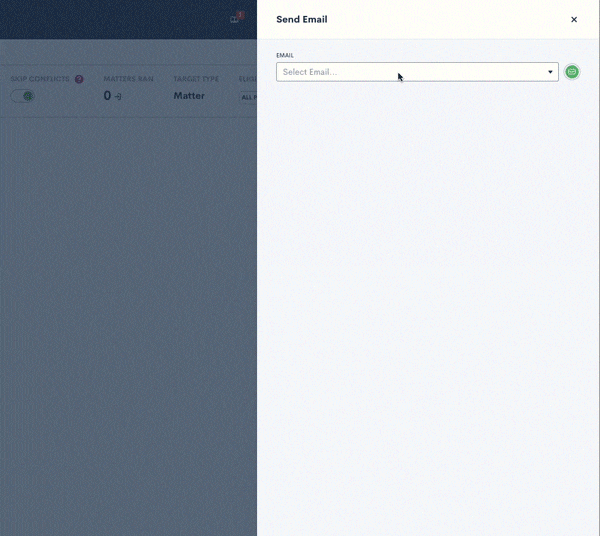
Create From Within is a complete reinvention of our UX (user experience). This revolutionary feature will change the way you interact with Lawmatics, giving you the ability to create any asset or object in Lawmatics from the very place that you need to use it. Need to send a new email to contacts? Now you can create the email right from wherever you typically select the email to use. Have a new contact that needs to be added as a relationship to a matter? No problem! Now you’ll be able to create that contact right from the add new relationship section of a matter. Anything and everything that you build and add to Lawmatics can be created without navigating to another screen!Our new user experience will be rolled out over the next couple of months. This release introduces you to the new right side slide-out experience which replaces our pop-up modal screens and also gives you the Create From Within capability for new emails from everywhere that emails are sent.We have spent countless hours talking to you, our passionate customer, and listening to your feedback. We are committed to making Lawmatics easier to get started with AND use in the day-to-day. This new UX is a direct response to the feedback we have received and we are extremely excited to save you even more time in your day.Stay tuned as we roll this feature out throughout the platform over the course of the next several releases.
Merge Duplicate Contacts
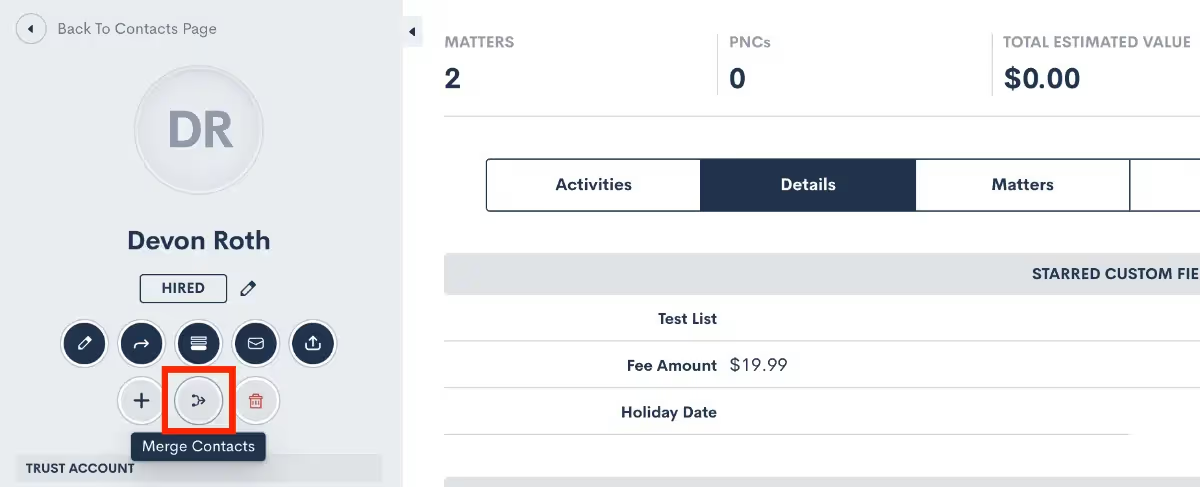
A highly requested feature, you now have the ability to easily merge any duplicate contacts that find their way into your CRM. While Lawmatics will continue to de-duplicate your contacts automatically based on email address, you can now manually merge any pesky duplicate contacts that don’t have an associated email address. Simply navigate to a duplicate contact, select the Merge Contacts button (as highlighted below), then select the other contact you wish to merge records with. The interface will then show you any discrepancies in data between the two contacts and allow you to select which data should remain on a merged contact on a field-by-field basis. No more manual duplicate checking and data transfer!For a simple breakdown of Contacts vs. Matters in Lawmatics, click here.
Built-In Appointment Confirmation

Scheduling and confirming consultations is an essential part of your intake process. While you may be accustomed to using an Automation to confirm/remind clients of their appointments, we’ve made this even easier by adding Confirmations messages as a default function — no need to build a dedicated Automation. When you navigate to the Appointments section of the Settings menu, you now have the option to create a Custom Email and/or SMS template for confirming each of your various appointment types. This confirmation will be sent automatically at the time the appointment is scheduled.Want to learn more about appointments in Lawmatics? Tune in to this month’s Deep Dive webinar.
Use Merge Fields in Custom Form Instruction Blocks

We’re introduced yet another way to add a personal yet automated touch to your client correspondence. As with your email templates and documents, you can now add Merge Fields to instructions blocks on your Custom Forms. This allows you to address your client by name or include any other personalized information within the Custom Form. When creating a Custom Form, simply drag and drop the Instructions Field into your Form and click on it to add your content.Click here for a crash course on Custom Forms and their advanced functionality.
Share File Folders to Client Portal
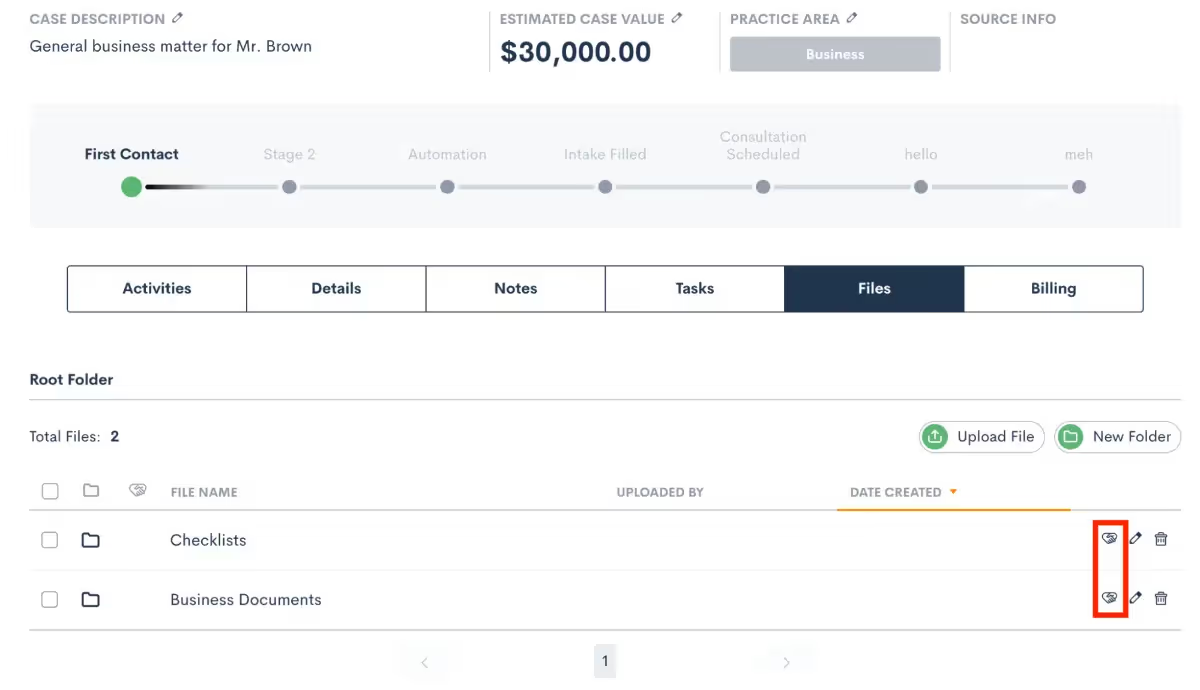
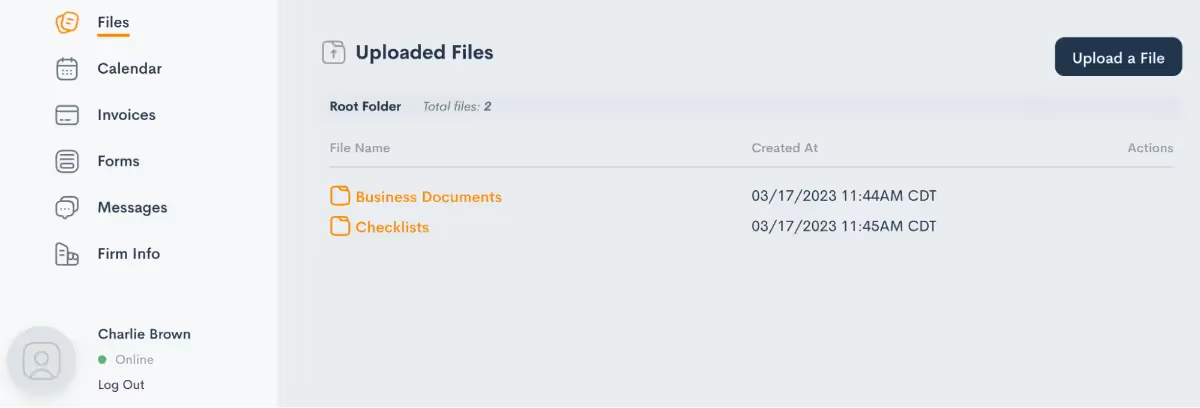
We recently released the ability to create a default set of File Folders within a Matter Profile to store documents and critical case files. Now we’ve taken this new feature a step further by enabling users to share these folders in the Client Portal of a matter contact outside of your organization. This makes it easy for any desired contact to gain instant access to said folders, along with their contents, with organization in mind. To use this feature, click the Portal Button on any Matter Folder (highlighted below).Not familiar with the Lawmatics Client Portal? Learn more about it here!—We sure think these new features are a slam dunk, and we hope you do too! As always, feel free to share any questions or comments on this latest release with us by emailing support@lawmatics.com.
Subscribe to get our best content in your inbox
Ready to grow your law firm with Lawmatics?
Schedule a demo of legal’s most trusted growth platform.
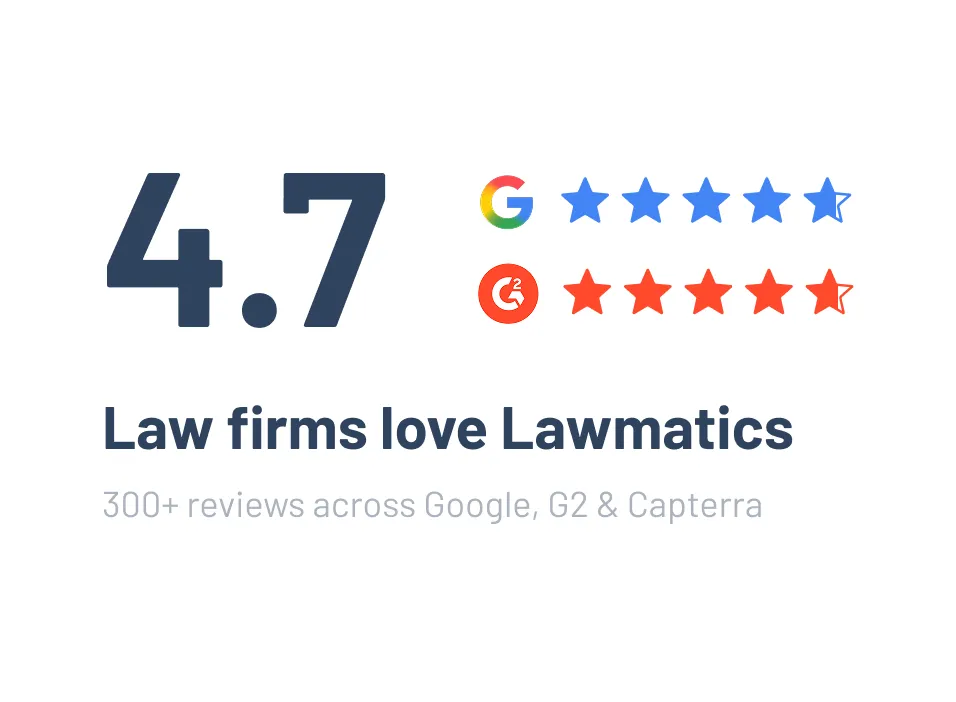




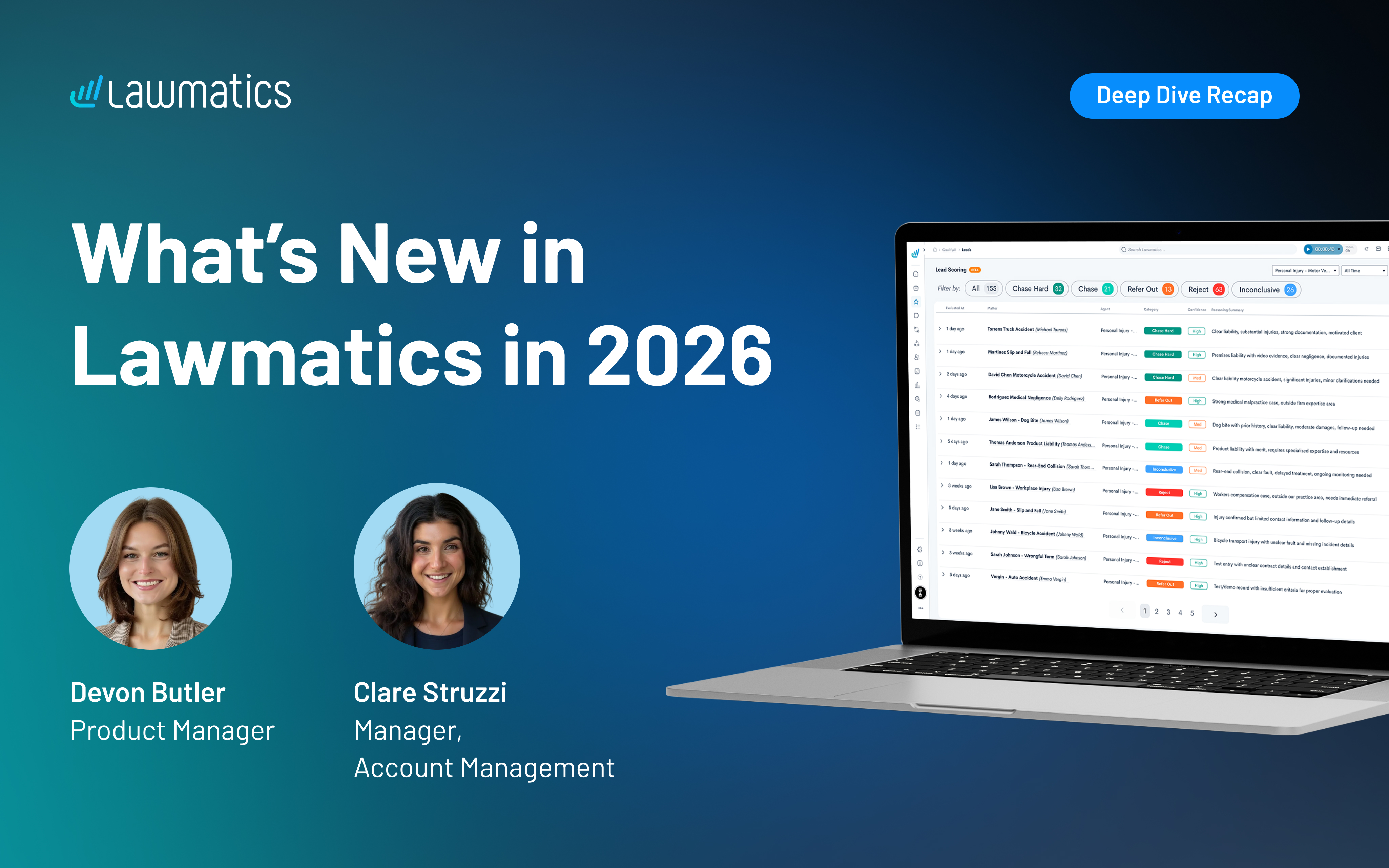


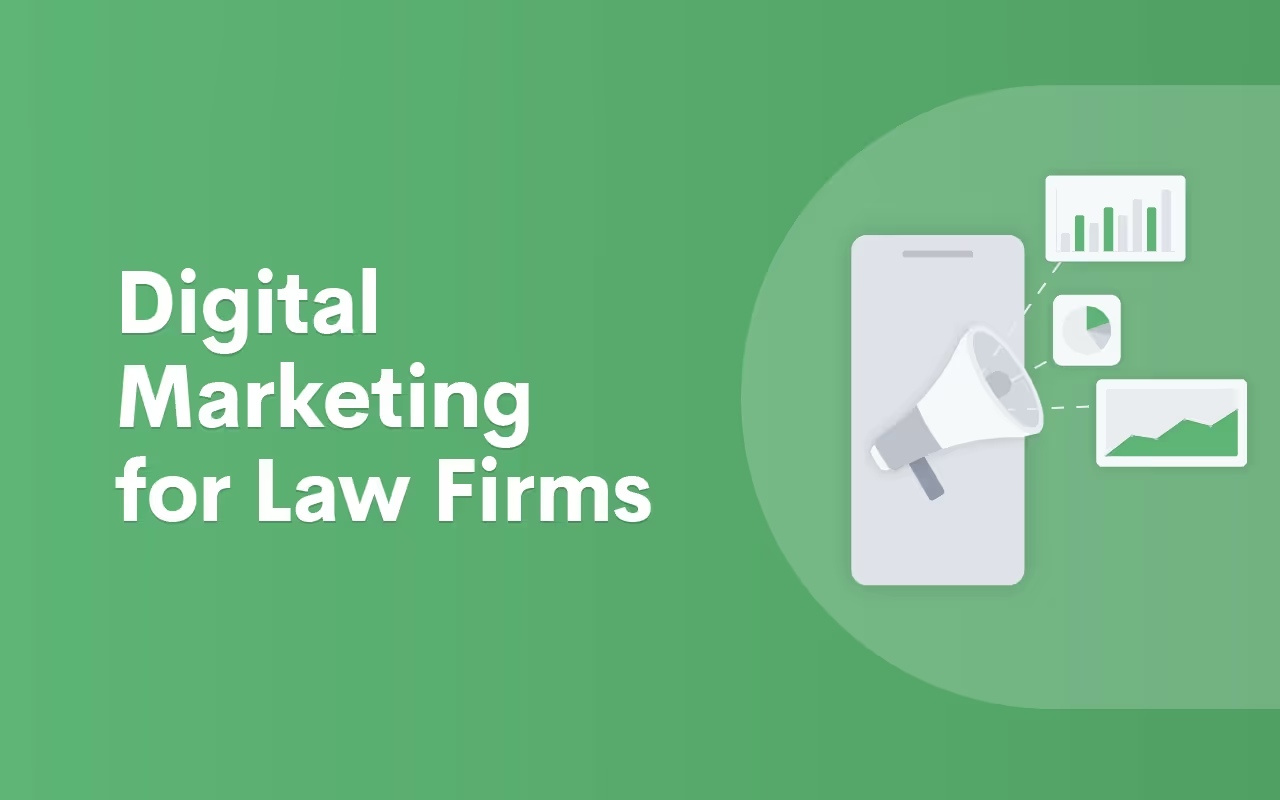

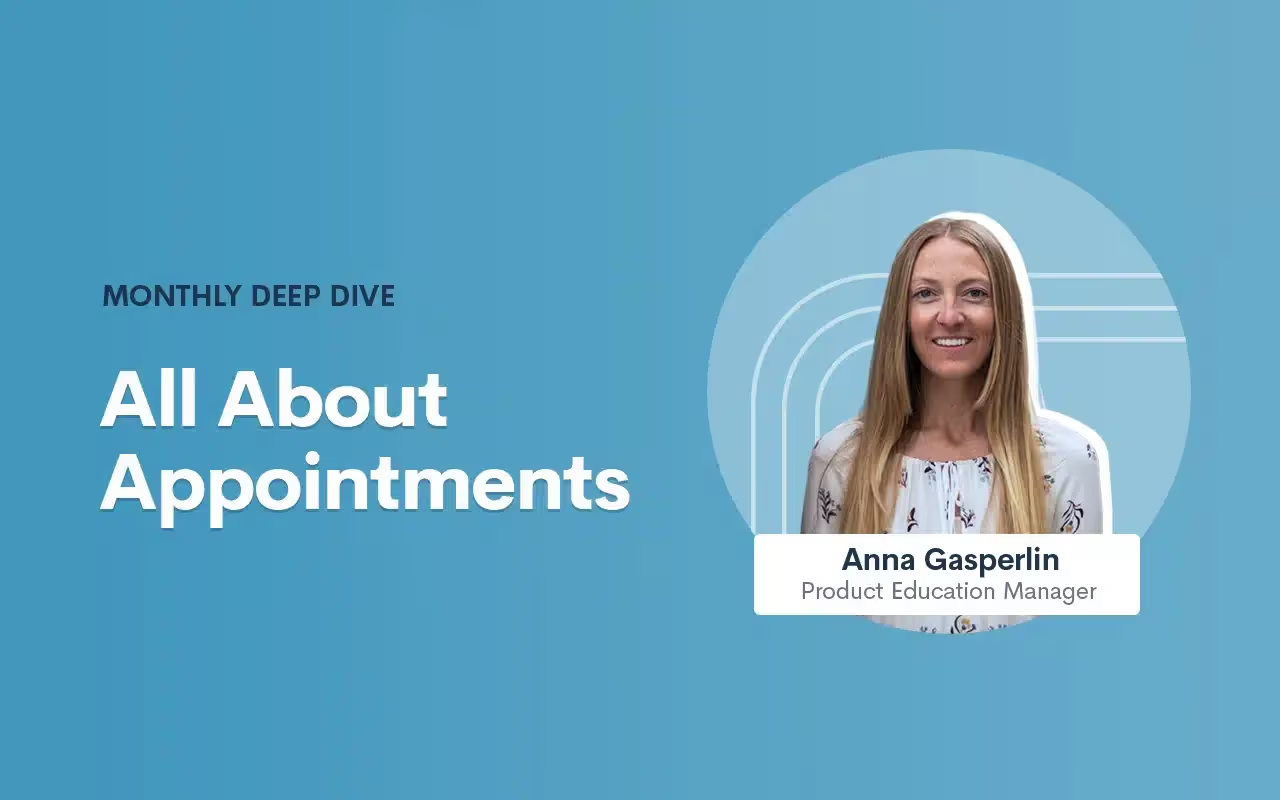


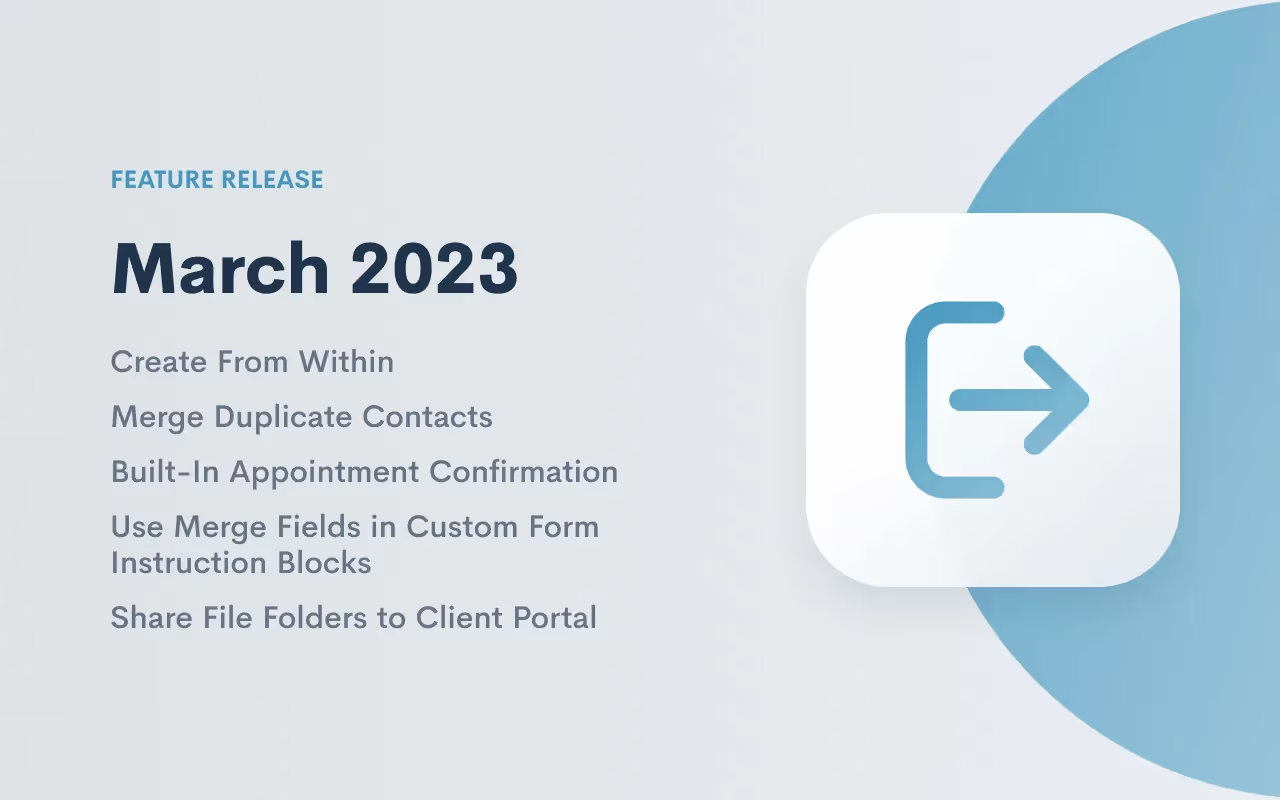
.avif)
.avif)

.avif)
